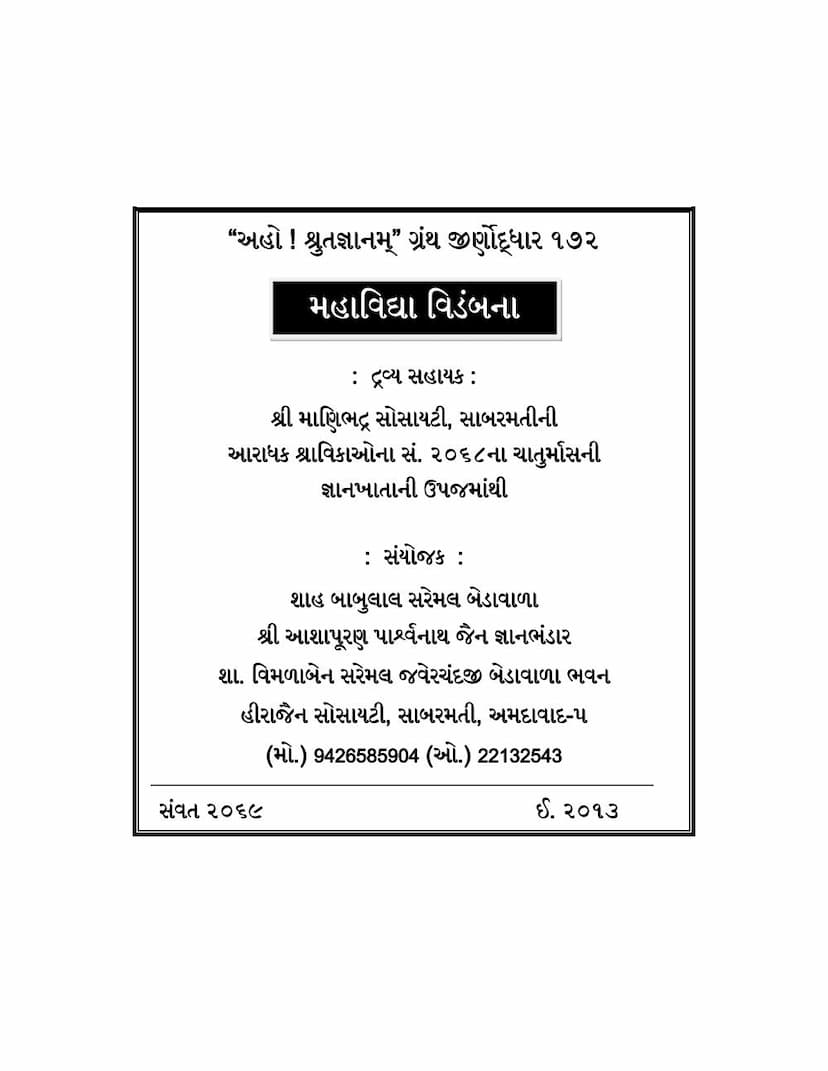Mahavidya Vidambanam
Added to library: September 2, 2025

Summary
Here's a comprehensive summary of the Jain text "Mahavidya Vidambanam" based on the provided pages:
Book Title: Mahavidya Vidambanam (The Mockery of Mahavidya) Author: Bhatta Vadindra (also known as Mahadeva) Commentators: Anandapūrṇa, Bhuvanasundara Suri Editor: Mangesh Ramkrishna Telang Publisher: Central Library, Baroda Publication Year: 1920 Series: Gaekwad's Oriental Series, No. XII
Overall Summary:
"Mahavidya Vidambanam" is a significant philosophical and logical text within the Jain tradition, authored by Bhatta Vadindra (Mahadeva). The work, along with its two commentaries by Anandapūrṇa and Bhuvanasundara Suri, and a related text "Dasha-sloki" by Kularka Pandita, aims to critique and refute a specific type of syllogism known as "Mahavidya" within the Nyaya (logic) school of philosophy.
The core of the text revolves around understanding and dismantling the "Mahavidya" syllogistic system. The author, Vadindra, argues that these Mahavidya syllogisms are fallacious and ultimately unproductive in establishing truth.
Key Concepts and Arguments:
-
What is Mahavidya?
- The text clarifies that "Mahavidya" in this context refers to a specific logical inference method, not the ten goddesses or great incantations as found in Tantric traditions.
- Vadindra defines Mahavidya as a "purely positive probans" (Kevalanvayi-hetu) that operates in conjunction with a pervader, aiming to establish a specific probandum desired by the disputant. It is called Mahavidya because it is claimed to be free from fallacies.
- The core of Mahavidya syllogisms is the use of the "Kevalanvayi-hetu" (purely affirmative probans), which is argued to be flawed and incapable of establishing definite conclusions.
-
The Origin of Mahavidya Syllogisms:
- The text suggests that Mahavidya syllogisms originated from a philosophical debate between the Mimamsakas (who held sound to be eternal) and the Mimansakas (who held sound to be non-eternal).
- A great Acharya of the Yuga school (likely referring to the Nyaya/Vaisheshika tradition), identified as Kularka Pandita, is credited with inventing Mahavidya syllogisms to prove the non-eternity of sound and convince the Mimamsaka disputants.
-
The Author and His Critique:
- Bhatta Vadindra (Mahadeva) was a prominent logician and a religious counselor to King Srisimha (likely related to the Yadava dynasty).
- Vadindra dedicates his work to refuting the Mahavidya syllogisms. He meticulously analyzes the different types of Mahavidya inferences, identifying various fallacies such as:
- Siddhahetu (Proven Probans): Similar to an unproven probans.
- Vyapyatvasiddhi (Unproven Pervasion): The pervasion of the probans to the probandum is not established.
- Viruddha (Contradictory Probans): A probans that proves the opposite.
- Anaikantika (Inconclusive Probans): A probans that can lead to different conclusions.
- Satpratipaksha (Neutralized Probans): A probans whose inferential power is nullified by an opposing argument.
- Upadhi (Accident): An ancillary condition that affects the pervasion.
- Arthantaratā (Irrelevance/Proving something unintended): The argument proves something other than what was intended.
- Siddhantaviplavakatva (Subversion of Established Doctrine): Contradicting one's own philosophical conclusions.
- Svavyaghatakatva (Self-Contradiction): The argument contradicts itself.
-
The Commentaries:
- Anandapūrṇa: His commentary is described as brief and provides an exposition of the text, though only a fragment of his work on the first chapter is available. Anandapūrṇa is identified with the author of "Vidyasagari," a commentary on Sriharsha's "Khandana."
- Bhuvanasundara Suri: His commentary, "Vyakhyana-dipika," is more extensive. He was a disciple of Somasundara Suri of the Tapagachha. Bhuvanasundara's commentary is valuable for its detailed analysis of Vadindra's arguments and its historical insights. He also wrote "Laghu-Mahavidya-Vidambana" and "Mahavidya-vivarana-tippana."
-
Historical Context:
- The introduction to the published volume by Mangesh Ramkrishna Telang provides a detailed historical overview of Mahavidya and its proponents and critics, tracing references from the 12th century up to the 15th century.
- The text highlights that modern Indian logic schools (like the Bengal school) did not recognize Mahavidya syllogisms.
- The introduction also discusses the authors mentioned in the texts, including Udayanacharya, Sivaditya Misra, and others, contributing to understanding the intellectual milieu in which Mahavidya was debated.
-
The Nature of the Debate:
- The "Mahavidya" as presented and critiqued by Vadindra is essentially a form of sophisticated logical argument that attempts to establish conclusions based on perceived universal affirmative relationships, but Vadindra argues these relationships are either fallacious, based on faulty definitions, or suffer from the fallacy of accident (Upadhi).
- The text engages deeply with the nuances of logical inference, particularly the Kevalanvayi-hetu, and aims to demonstrate its limitations and fallacious nature.
In essence, "Mahavidya Vidambanam" is a scholarly and rigorous dissection of a particular logical system within Indian philosophy, demonstrating the author's profound understanding of Nyaya and his commitment to revealing the flaws in arguments that claim to establish universal affirmative relationships. The commentaries provide further depth and context to Vadindra's powerful critique.